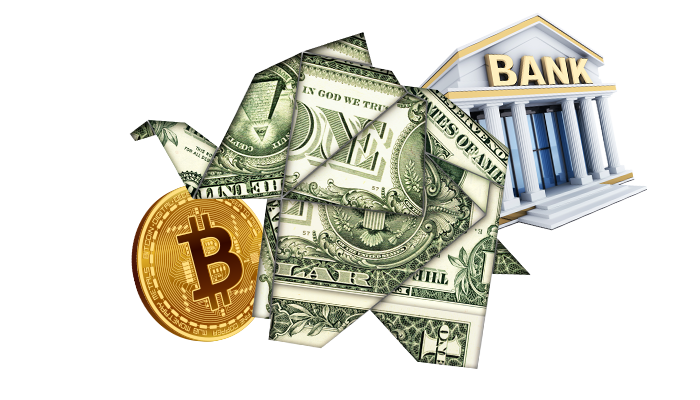How will banks respond to crypto?
Apr 9, 2018 published by Wirex Team As the financial crisis of 2008 held the world hostage, one man offered a solution. Bitcoin was Satoshi Nakamotos response, the worlds first cryptocurrency; an open source project which meant there was no need for banks and people could be responsible for their own wealth. At a time when people were at the mercy of harsh economic forces commanding their lives, a new system was envisaged, and one that fed scepticism of traditional financial services and offered a solution that could reshape the world of banking.
Why do we have banks?
At the moment we have one party we trust with transactions - a bank. But cryptocurrencies live on the blockchain, a decentralised ledger, so the trust is held by everyone, rather than one party. In other words, the blockchain represents a trust in data rather than in people. Banks are the biggest buildings in the city - historically trusted entities for storing our money. But increasingly for banks, the elephant in the room is that there may eventually be no need to place trust in only one source, especially one that has betrayed the public so many times. Banks generally charge fees for doing anything with money, even just holding on to it. That's because the banks have created a level of trust that transactions pass smoothly and everything is recorded and accounted for correctly. But as the financial crisis of 2008 proved, banks are not above abusing trust to line their own pockets. As Satoshi Nakamoto put it - "The root problem with conventional currency is all the trust that's required to make it work. The central bank must be trusted not to debase the currency, but the history of fiat currencies is full of breaches of that trust. Banks must be trusted to hold our money and transfer it electronically, but they lend it out in waves of credit bubbles with barely a fraction in reserve. We have to trust them with our privacy, trust them not to let identity thieves drain our accounts."
Do we really need banks?
Instead of trusting a single entity like a bank, we can trust the blockchain. Bankers are the middlemen of money - charging fees for taking charge of our funds. The vast sums of money that flow into their vaults are the result of interest payments and fees - not something that directly benefits the economy. Blockchain provides an alternative way to store and transact funds, and smart contracts mean that they can also perform functions that banks would traditionally have been able to. For example, if you wanted to buy some stocks or shares through a bank, this is something a smart contract could potentially handle with minimal fees, and complete accountability - simply by automatically issuing a certain number of stocks and shares when it receives money. Banks that dont adapt to this technology may find themselves unable to compete with those who do, and so it is understandable why they might be alarmed. Decentralised cryptocurrencies allow people to trade directly with each other, cutting out the need for any kind of middleman.
How are banks recognising this threat?
That many banks and regulators are cutting off relationships between fiat currency and cryptocurrency shows their concern for investors being exposed to such volatility. But there is an element of duplicity here: After CEO Jamie Dimon publicly shamed Bitcoin, it emerged that JP Morgan had recently filed a patent for an online payments system with Bitcoin-like characteristics. Other cryptocurrencies like Ripple have joined forces with the banks to provide technology for online payment solutions, despite heavy criticism from crypto-purists that believe in doing so they lose the democratising benefits of decentralisation. Blockchain has definitely not escaped the banks radar, but exploration of the technology is going on behind the scenes, while they maintain the public appearance of preserving stability by cracking down on this potential threat. And make no mistake, cryptocurrencies are a threat; representing an entirely new financial system with a different realm of utility, efficiency and cost-effectiveness. This is only likely to become more dangerous to banks as we see more fiat gateways and more user-friendly crypto wallets. As crypto becomes so user-friendly that your gran can send a payment across the world at the click of a button, banks charging extortionate fees for such transfers will have identified a problem. In order to not get outmanoeuvred, the existing large-scale financial institutions are going to need to keep a close eye on developments in the crypto world, but they will still see themselves as having a place in the future of global finance. Despite crypto offering the ability to take full responsibility for your own funds, for many people this might not appeal. If banks can serve these new demands and integrate with blockchain technology, then they might just be able to stay relevant. For the crypto-friendly personal finance platform of the future, we think we've got you covered
NOW.
